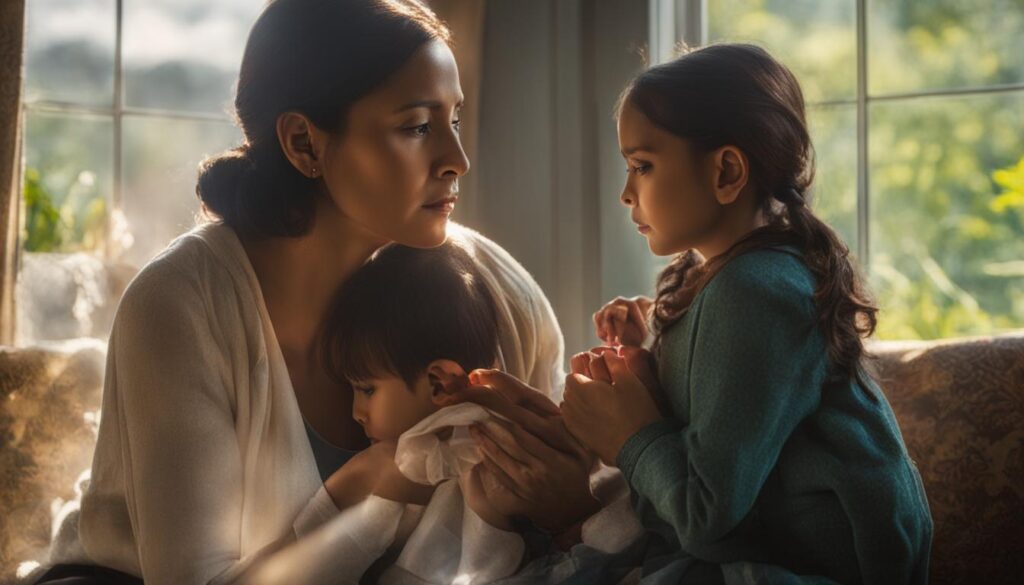“You only lose what you cling to.” – Gautama Buddha
When your grown child breaks your heart, it feels as if a piece of your soul has been shattered. The pain can be overwhelming, leaving you confused, hurt, and questioning everything you thought you knew about your parent-child relationship. Coping with adult child estrangement, rejection, or betrayal is an emotionally challenging journey, but it is one that you can navigate with grace and resilience.
This article explores the profound emotional impact of adult child heartbreak and provides guidance on how to heal and rebuild your relationship with your adult child. It delves into the complexities of parent-child relationships in adulthood, acknowledging the challenges posed by changing dynamics and generational differences. It also offers practical steps to address the situation with your adult child, emphasizing open communication, active listening, and setting boundaries.
Throughout this journey, self-reflection and personal growth play a vital role in finding peace and understanding. Nurturing forgiveness and emotional detachment become key aspects of healing, allowing for a healthier and more balanced approach to rebuilding the relationship. This article also highlights the importance of finding hope, fostering acceptance, and staying positive as you work towards reconciliation.
Remember, healing after your grown child breaks your heart is an ongoing process. It requires patience, compassion, and a willingness to learn from the experience. By embracing the teachings of Gautama Buddha and letting go of what no longer serves you, you can find peace within yourself and nurture the possibility of rebuilding a loving bond with your adult child.
Key Takeaways:
- Coping with adult child estrangement, rejection, or betrayal is a challenging emotional journey.
- Understanding the complexities of parent-child relationships in adulthood is crucial for navigating through heartbreak.
- Managing emotions, seeking support, and grieving are essential steps towards healing.
- Open communication, active listening, and setting boundaries are key when addressing the situation with your adult child.
- Engaging in self-reflection, personal growth, and nurturing forgiveness are essential for finding peace and rebuilding the relationship.
Understanding the Complexity of Parent-Child Relationships in Adulthood
Parent-child relationships undergo significant changes as children transition into adulthood. Navigating these complexities can be both rewarding and challenging for parents. To fully comprehend the intricacies of parent-child relationships in adulthood, it is essential to explore the impact of generational differences, the evolving dynamics between parents and grown children, and the significance of effective communication.
As children grow into adulthood, they develop their own unique identities and motivations. These generational differences can create a significant gap in understanding between parents and their grown children. It is crucial for parents to acknowledge and embrace these disparities, striving to bridge the generation gap through open-mindedness and empathy.
The shifting dynamics in a parent-child relationship can also pose challenges. Parents must adapt to their grown child’s newfound independence, allowing them to navigate life’s challenges while offering guidance and support when needed. The changing balance of power and the need to establish mutual respect and boundaries require parents to strike a delicate balance between involvement and allowing space for their adult child to thrive.
Effective communication serves as the foundation for a healthy parent-child relationship in adulthood. Honest and open conversations strengthen understanding, trust, and connection. By actively listening and expressing themselves sincerely, parents can foster an environment of mutual respect and empathy. Furthermore, utilizing various forms of communication, such as face-to-face conversations, phone calls, and messaging apps, allows parents to adapt to their adult child’s preferred means of communication.

Understanding the complexities of a parent-child relationship in adulthood necessitates a willingness to adapt and accommodate the unique challenges faced by both parties. By recognizing the impact of generational differences, navigating evolving dynamics, and prioritizing effective communication, parents can foster a strong and harmonious relationship with their grown child.
The Emotional Journey When Your Grown Child Breaks Your Heart
When a grown child breaks your heart, it can be an incredibly challenging and emotional experience. The emotional impact of adult child heartbreak can manifest as a range of intense emotions, including hurt, disappointment, anger, and guilt. As a parent, it can be difficult to navigate through these emotions and find ways to heal.
Dealing with hurt and disappointment from your adult child requires acknowledging and understanding your emotions. It’s important to recognize that it’s okay to feel these emotions and give yourself permission to grieve. The stages of grieving, similar to any other loss, may include denial, anger, bargaining, depression, and finally, acceptance. Each person’s journey through these stages is unique, and it’s crucial to allow yourself the time and space to process your emotions.
Managing emotions as a parent during this time is key to finding healing and moving forward. It’s important to practice self-care and engage in activities that bring you comfort and joy. This could involve seeking support from loved ones, engaging in hobbies, or practicing mindfulness and relaxation techniques. By managing your emotions, you can not only take care of yourself but also set a positive example for your adult child.
During the heartbreak of adult child estrangement, finding support is essential. Surrounding yourself with a network of understanding friends and family can provide comfort, guidance, and perspective. Connecting with others who have experienced similar situations through support groups or counseling can also provide a safe space to share your feelings and gain valuable insights. Finding support during this challenging time can help you navigate the emotional complexities and find solace in knowing that you’re not alone.
Throughout the emotional journey of heartbreak caused by your grown child, it’s important to remember that healing takes time. Allow yourself the opportunity to grieve, process your emotions, and seek the support you need. Taking these steps will help you find the strength to move forward, rebuild, and ultimately find peace and understanding.
| Key Strategies | Benefit |
|---|---|
| Recognize and acknowledge your emotions | Allows for the healing process to begin |
| Practice self-care and engage in activities that bring you comfort | Manages emotions and promotes personal well-being |
| Seek support from friends, family, or support groups | Provides comfort, guidance, and a sense of community |
| Allow yourself time to grieve and process your emotions | Facilitates healing and acceptance |

Noteworthy Quote:
“Healing from the heartbreak caused by your grown child requires not only acknowledging your emotions but also seeking support and taking the time to grieve and heal. By managing your emotions and finding a supportive network, you can navigate through this challenging journey and ultimately find peace and understanding.”
Steps to Take When Addressing the Situation with Your Adult Child
When your adult child breaks your heart, it’s essential to address the situation with open and honest communication. Here are some practical steps you can take to navigate through this difficult time and work towards rebuilding your relationship:
- Listen with empathy: It’s crucial to actively listen to your adult child’s perspective and emotions without judgment. Create a safe space for them to express their feelings, allowing for mutual understanding.
- Express your emotions: Share your own feelings honestly and respectfully, using “I” statements to avoid accusatory language. This open expression can facilitate a deeper connection and encourage your adult child to do the same.
- Set boundaries: Establishing clear boundaries is essential for healthy communication and protecting your own emotional well-being. Communicate your boundaries calmly and assertively, ensuring both parties understand and respect them.
- Seek professional help: If the heartbreak and estrangement persist, consider enlisting the support of a professional therapist or counselor experienced in family dynamics. They can provide guidance and facilitate productive dialogue between you and your adult child.
- Rebuild gradually: Rebuilding a relationship takes time and effort from both sides. Start with small steps, such as casual conversations or engaging in shared interests, allowing the bond between you and your adult child to gradually strengthen.
Dealing with heartbreak from your adult child is a challenging journey, but by practicing open communication, active listening, and setting boundaries, you can navigate these difficult emotions and work towards rebuilding a stronger relationship. Seeking professional help when needed can provide additional support and guidance along the way.

| Steps to Take When Addressing the Situation with Your Adult Child |
|---|
| Listen with empathy |
| Express your emotions |
| Set boundaries |
| Seek professional help |
| Rebuild gradually |
Cultivating Self-Reflection and Personal Growth
When your grown child breaks your heart, it’s a painful experience that often leaves you questioning your own role in the relationship. Self-reflection is a vital step towards healing and understanding. Taking the time to introspect allows you to gain insights into your behavior, reactions, and patterns within the parent-child dynamic.
By delving into your own thoughts and emotions, you can identify areas for personal growth. This process helps you acknowledge your own strengths and weaknesses, enabling you to recognize how they may have influenced the relationship with your adult child. It’s essential to remember that personal growth is an ongoing journey, filled with opportunities to learn from past experiences.
Learning from the heartbreak with your grown child allows you to gain valuable insights that can shape your future actions and interactions. It’s a chance to develop a deeper understanding of your adult child’s needs, desires, and perspectives. By embracing this understanding, you can adapt your behaviors, communication style, and approach to meet the changing dynamics of the parent-child relationship.

Maintaining open-mindedness and accepting changing dynamics is fundamental to rebuilding a stronger relationship with your adult child. By being open to growth, both individually and together, you lay the foundation for healing and reconciliation.
The Power of Self-Reflection in Rebuilding the Relationship
Self-reflection propels personal growth and understanding within parent-child relationships. It allows you to recognize and acknowledge your own role in the heartbreak, fostering empathy and forgiveness. By taking responsibility for your actions, you create an environment conducive to rebuilding trust and connection.
Acknowledging your mistakes and expressing sincere apologies can be transformative. It demonstrates your commitment to personal growth and highlights your willingness to repair the relationship. However, it’s important to remember that this process requires patience and understanding, both for yourself and your adult child.
Engaging in Personal Growth to Forge a Stronger Bond
Personal growth is an empowering journey that transcends the heartbreak caused by a grown child. As you develop and learn from the experience, you become better equipped to navigate the changing dynamics of the parent-child relationship.
Investing in your personal growth allows you to cultivate emotional resilience, empathy, and understanding. It equips you with the tools to communicate effectively, set healthy boundaries, and adapt to the evolving needs of your adult child. By embracing personal growth, you can foster a deeper and more meaningful connection with your grown child.
Remember, healing and rebuilding take time. It’s crucial to approach the process with patience, compassion, and an unwavering commitment to personal growth. By continuing to learn, grow, and adapt, you can forge a relationship with your adult child that is mutually fulfilling and resilient.
| Benefits of Self-Reflection and Personal Growth |
|---|
| Enhanced self-awareness |
| Increased empathy and understanding |
| Improved communication skills |
| Stronger emotional resilience |
| Deeper mutual trust and connection |
Nurturing Forgiveness and Emotional Detachment
When your grown child breaks your heart, forgiveness and emotional detachment play vital roles in the healing process. Nurturing forgiveness allows you to let go of resentment and create space for understanding and reconciliation. At the same time, emotional detachment empowers you to set necessary boundaries, protect your mental health, and maintain emotional well-being.
Forgiveness is a powerful tool that can release you from the burden of anger and resentment. By forgiving your adult child, you free yourself from the negative energy that can hinder your own healing and growth. It is important to understand that forgiveness does not mean condoning their actions or forgetting the pain caused. Instead, it is a personal choice to let go of the emotional baggage and allow room for healing and restoration.
Emotional detachment goes hand in hand with forgiveness. It involves setting clear emotional boundaries to protect yourself from further hurt and disappointment. By establishing these boundaries, you create a safe space for your own emotional well-being and maintain mental health. Emotional detachment allows you to shift focus towards self-care, personal growth, and finding peace within yourself.
To nurture forgiveness and emotional detachment, consider the following steps:
- Self-reflection: Take time to reflect on your own emotions, thoughts, and experiences. Understand your triggers and identify patterns that contribute to resentment or emotional turmoil.
- Practice empathy: Put yourself in your grown child’s shoes and try to understand their perspective. This can help cultivate compassion and facilitate the forgiveness process.
- Seek support: Reach out to trusted friends, family members, or even professional therapists who can provide guidance and perspective during this challenging journey.
- Set boundaries: Clearly define and communicate your emotional boundaries to your adult child. This ensures that you protect yourself from further heartbreak while still leaving room for growth and reconciliation.
Remember that nurturing forgiveness and emotional detachment is an ongoing process. It may take time and effort, but with patience and self-care, you can find healing and create a healthier parent-child relationship. Letting go of resentment and setting emotional boundaries are crucial steps towards maintaining your own mental health and finding peace within yourself.
Finding Hope and Rebuilding the Relationship
When your grown child breaks your heart, it may feel like all hope is lost. The pain and disappointment can be overwhelming, but it’s important to remember that healing and rebuilding are possible. By taking active steps for reconciliation, fostering acceptance, positivity, and open communication, you can work towards rebuilding a stronger relationship with your adult child.
Rebuilding a broken relationship requires effort and understanding from both sides. It’s essential to approach the situation with empathy and an open mind. By actively listening to your adult child’s perspective and taking their feelings into account, you can create a safe space for open communication and genuine connection. This may involve addressing past hurts, acknowledging mistakes, and seeking forgiveness.
Acceptance is also a crucial aspect of the healing process. While it may be challenging to let go of the pain and resentment, it’s important to focus on acceptance and understanding. Accept that both you and your adult child are imperfect and have made mistakes. Embrace the opportunity to grow together and create a new, healthier relationship.
To foster a positive environment for reconciliation, maintain a hopeful and optimistic mindset. Celebrate the small victories and progress made in the relationship. Express gratitude for the moments of connection and understanding, no matter how brief or infrequent they may be. Surround yourself with positive influences, such as supportive friends and family, who can uplift and encourage you throughout your journey.
Active Steps for Reconciliation
Rebuilding a relationship with your adult child requires taking proactive steps towards reconciliation. Here are some active steps you can take:
- Initiate open and honest conversations: Create a safe space for open communication and listen to your adult child’s perspective.
- Practice active listening: Truly listen to their words and seek to understand their emotions and experiences.
- Set healthy boundaries: Establish boundaries that respect both your needs and your adult child’s boundaries.
- Seek professional help if needed: Consider family therapy or counseling to facilitate open dialogue and promote understanding.
- Engage in activities together: Find common interests or hobbies that can help you reconnect and bond.
- Show unconditional love and support: Let your adult child know that you love them unconditionally, regardless of past conflicts or disappointments.
| Steps for Reconciliation | Benefits |
|---|---|
| Create a safe space for open communication | Allows for honest conversations and understanding |
| Practice active listening | Helps build empathy and strengthens the parent-child bond |
| Set healthy boundaries | Establishes mutual respect and promotes emotional well-being |
| Seek professional help if needed | Provides guidance and facilitates productive conversations |
| Engage in activities together | Creates shared experiences and opportunities for connection |
| Show unconditional love and support | Reassures your adult child of your unwavering love and commitment |
Remember, rebuilding a relationship takes time, patience, and effort from both parties. Stay committed to the process and be open to growth and change. With acceptance, positivity, and open communication, there is hope for a renewed and restored relationship with your grown child.
Conclusion
Healing after the heartbreak caused by your grown child is a challenging journey, but it is one that is full of possibilities. Throughout this article, we have explored the importance of managing your emotions, rebuilding the parent-child relationship, finding peace and understanding, and embarking on a journey towards reconciliation.
It is crucial to acknowledge the resilience and strength within yourself as you navigate through the pain. By actively addressing the situation, practicing open and honest communication, and setting boundaries, you can pave the way for healing and rebuilding the bond with your adult child.
Remember to engage in self-reflection and personal growth to understand your own role in the relationship. Embrace forgiveness and emotional detachment, allowing yourself to let go of resentment and set emotional boundaries. Along this journey, finding hope, accepting the changing dynamics, and nurturing positivity and open communication are essential.
Ultimately, the path to healing and rebuilding the relationship with your grown child is a continuous one. Be patient and compassionate with yourself and your child as you work towards finding peace and understanding. The journey to reconciliation may have its ups and downs, but with determination and love, it is possible to find healing and create a stronger, more resilient bond.
FAQ
How do I cope with the heartbreak caused by my grown child?
Coping with the heartbreak caused by your grown child can be a difficult process, but there are steps you can take to help you heal. It’s important to allow yourself to grieve and express your emotions. Seeking support from friends, family, or a therapist can also provide guidance and comfort during this challenging time.
Is it possible to rebuild a relationship with my estranged adult child?
Yes, it is possible to rebuild a relationship with your estranged adult child, but it requires effort and willingness from both parties. Open and honest communication, active listening, and setting boundaries can be instrumental in rebuilding trust and understanding. Patience and perseverance are key as you work towards healing and reconciliation.
How can I manage my emotions while dealing with adult child rejection?
Managing your emotions while dealing with adult child rejection can be overwhelming. It’s important to acknowledge and validate your feelings, but also find healthy ways to cope such as practicing self-care, engaging in activities that bring you joy, and seeking support from others. Taking care of your mental and emotional well-being is crucial during this challenging time.
How can I find peace and healing after experiencing adult child betrayal?
Finding peace and healing after experiencing adult child betrayal can be a long and complex journey. It’s important to allow yourself to feel the pain and betrayal, but also to focus on your own growth and healing. Engaging in self-reflection, seeking therapy or counseling, and nurturing forgiveness and emotional detachment can help you find peace and healing in time.
How can I support my estranged adult child while also taking care of myself?
Balancing support for your estranged adult child while taking care of yourself can be challenging. It’s important to set healthy boundaries and prioritize your own well-being. Seeking professional help or therapy can provide guidance on navigating this delicate balance. Remember, you can only truly support your adult child when you are taking care of yourself first.
How can I navigate the changing dynamics of the parent-child relationship in adulthood?
Navigating the changing dynamics of the parent-child relationship in adulthood requires adaptability and understanding. Recognizing and accepting the generational differences and allowing for open and respectful communication can ease the transition. It’s important to let go of the traditional parent-child roles and embrace a new dynamic based on mutual respect and adult-to-adult interaction.

